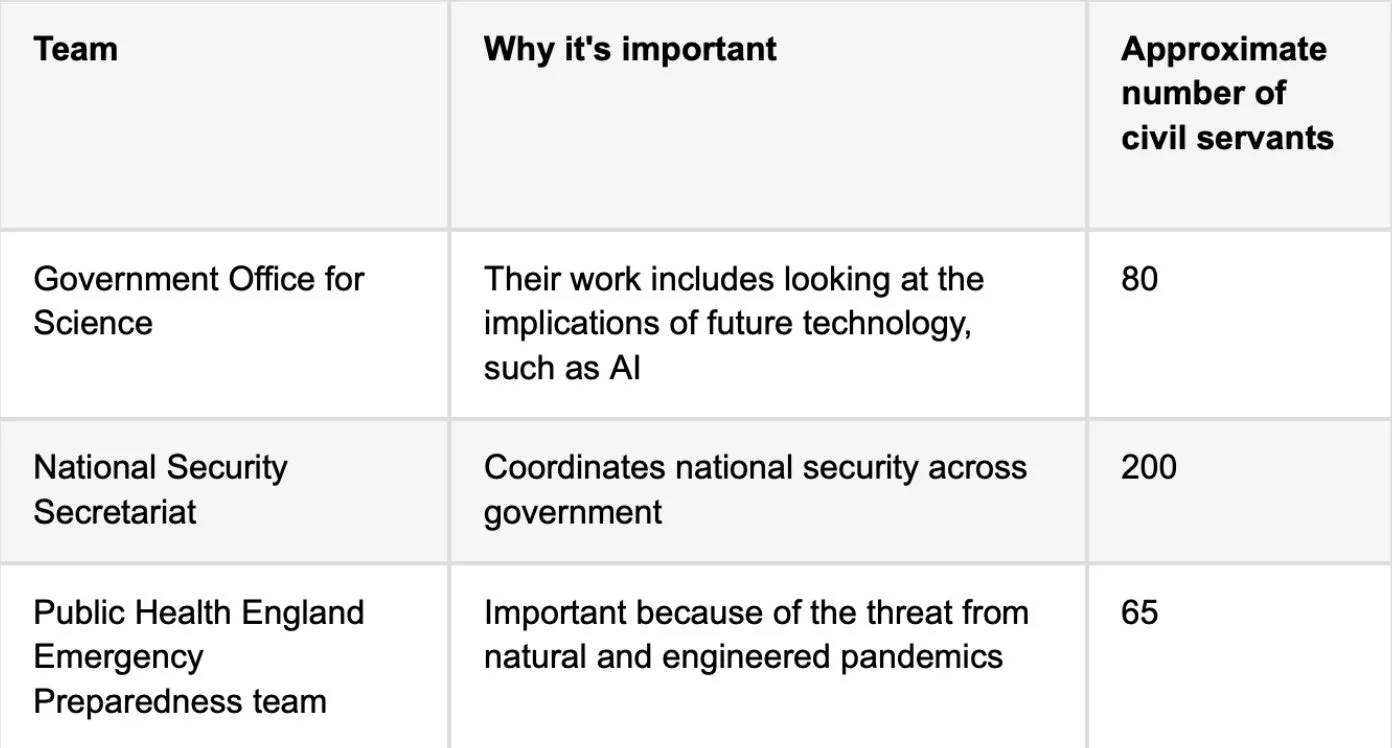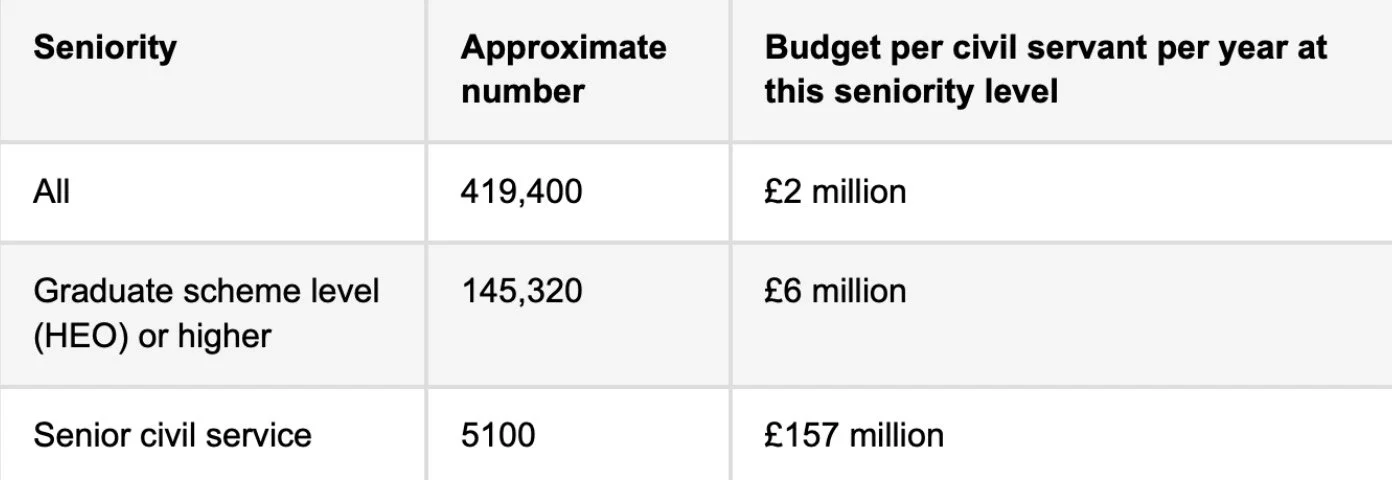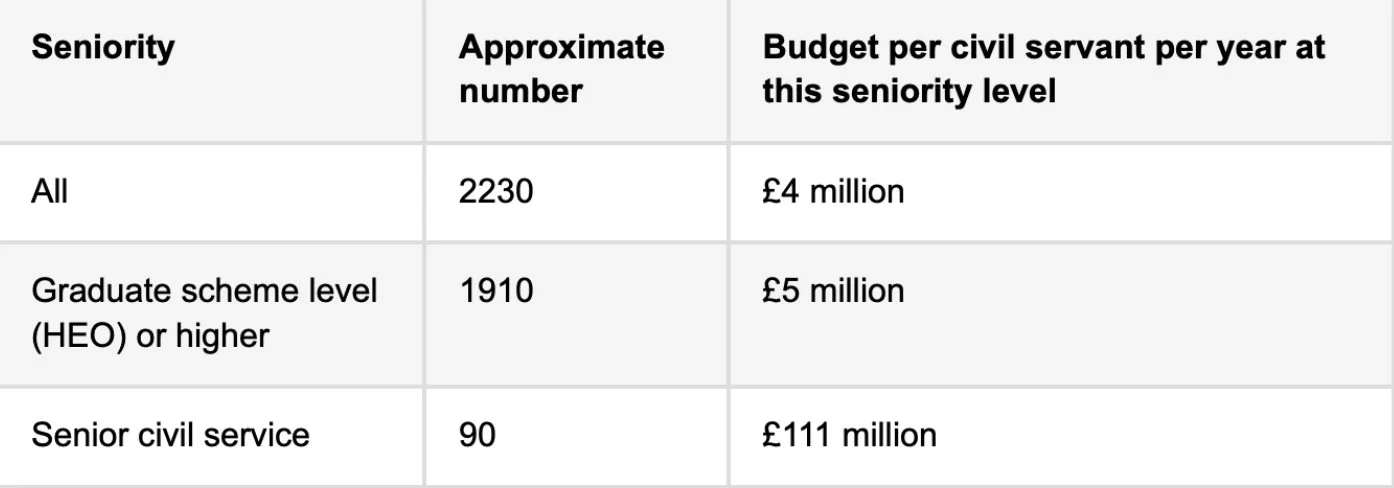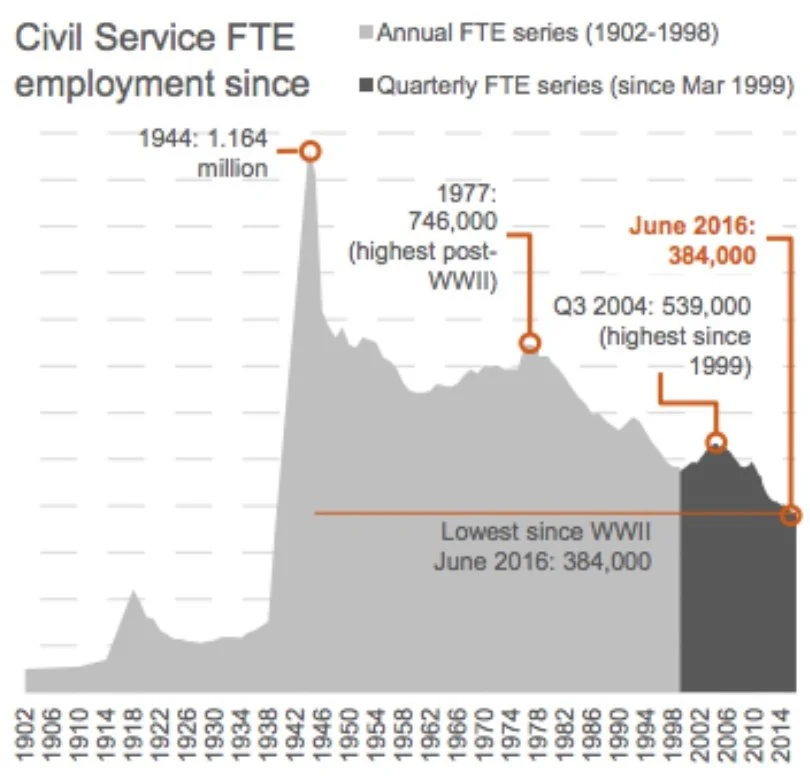
Should you be a Christian Civil Servant?
Written March 4 2025
Est. 14 minute read
Summary
At CFI, we help Christians discern meaningful, impactful careers, and the civil service is one such pathway. Working as a civil servant in the UK government offers a unique opportunity to directly influence how the country tackles pressing global challenges. The civil service allows you to apply your skills in policy, politics, and public administration to effect significant, long-term change.
However, like many large organisations, the civil service comes with challenges. The scale and bureaucracy can make it difficult to see the direct impact of your work. Additionally, the work culture can be quite traditional, and roles may offer lower salaries compared to the private sector. That said, the civil service is an excellent career option for those seeking varied and intellectually stimulating work that combines analytical and interpersonal skills. As Christians, we can use our virtues to pursue higher positions of influence in government, with a commitment to shaping policies that reflect justice, compassion, and responsibility for future generations. By doing so, we can contribute to the greater good of society and help guide decisions that support vulnerable communities.
Pros:
Potential for large impact on pressing global problems
Build valuable skills and a strong network, especially for future policy work
Varied and often intellectually stimulating work
Reasonable hours in a supportive environment
Cons:
Hard to directly see your impact, which can make it less motivating
You'll be working in a large bureaucratic organisation with a conventional culture
Less flexible career capital than the best private sector options
Lower salaries than the private sector
Key facts on fit
Happy to work in large organisations on policies you might disagree with; for graduate schemes; a degree with at least a 2:2; for some roles: a relevant degree subject (e.g. quantitative subjects, economics, social science, or postgraduate science or engineering). For all roles you need to be a citizen of the EEA, a commonwealth country, Switzerland, or Turkey, and some are only open to British citizens.
Introduction
In 2019, after years of rising concerns over global health threats, Professor Chris Whitty was tasked by the government with strengthening the UK's health security. Whitty was clear: “We need a long-term strategy to protect public health, and we need it now.”
Determined to tackle pressing challenges, he collaborated with civil servants and experts to develop plans that would prepare the country for the next public health emergency. A key focus of their work was addressing antimicrobial resistance, a growing global threat to modern medicine.
Through his leadership, Whitty helped ensure that public health policy was not only reactive but also preventive, emphasising the importance of evidence-based decision-making. His work laid the groundwork for a comprehensive strategy that would strengthen the UK's health resilience for years to come.
Although his initiatives have yet to receive widespread recognition, Whitty’s influence on shaping long-term health policy could ultimately transform the UK’s approach to managing public health crises and set a global standard.
What if you could have this kind of impact?
There are civil servants working on some of the world’s most urgent problems, from how to prevent nuclear proliferation to encouraging economic growth in the developing world. Like Whitty, they often have opportunities to play a central role in solving these problems.
In this profile we cover why it’s possible to have a significant impact as a civil servant, how you can get in, and what you can do to maximise your impact once you’re in.
This profile is focused on the UK civil service, but it opens with a general argument for government jobs that we think applies to many countries.
If you’re looking for information about policy careers in the US, you might be more interested in these articles:
Our career profile on working as a congressional staffer
Our career profile on working as a think tank researcher
What is this profile based on?
Kirsten Horston, a senior policy advisor at the Department for Energy security and Net Zero, has offered insight into co-ordinating with over 200 civil servants, guiding policy inclusion and briefing senior officials.
The profile also consists of interviews conducted by 80,000 Hours who spoke to eight civil servants: three in the Treasury, two generalist fast streamers, one economist fast streamer, one statistics fast streamer, and one digital fast streamer. Additionally, a senior political adviser, an experienced civil servant now working at a think tank, and Owen Barder, a development economist and former civil servant (interview here).
Contents is also drawn from the official Fast Stream website, the books Policy Bureaucracy: Government with a Cast of Thousands, Everyday Life in British Government, Who Governs Britain?, and How to be a Civil Servant and the accompanying website. The opinions of other organisations who have investigated this pathway (e.g. The Guardian and the Institute for Government).
What is this career path?
Government ministers are the decision makers but civil servants run government departments, advising ministers and executing decisions. They are politically neutral – they keep their jobs when the government changes and they have to execute ministers’ decisions even if they disagree with them.
We’ve written this profile for graduates because mid-level and senior civil servants usually have degrees. You can get many civil service jobs without a degree, but we’re not sure whether you’d be able to reach the most senior levels or work in the highest impact areas.
In the first few years you could be:
Working in the office of a government minister: helping them communicate with the rest of the department, organising their day, and attending meetings alongside them.
Working out how to reduce offshore tax evasion.
Estimating the economic impact of health and safety regulations.
When you’re more senior, you could have a great deal of responsibility. Some representative roles are:
Director of West and Southern Africa for the Department for International Development.
Deputy National Security Adviser, Intelligence Security and Resilience at the Cabinet Office.
Director of Higher Education Policy at the department for Business, Energy, and Industrial Strategy.
Permanent Secretary of the Home Office, the most senior civil servant in the department.
You can start your career in three main ways:
The Fast Stream: a graduate scheme designed to accelerate you into senior positions. There are several ‘schemes’ within the Fast Stream for different types of role, such as economists, statisticians, generalists, and diplomats.
A graduate scheme run by a specific department such as the Treasury or the Department for International Development. Most departments don’t run their own graduate schemes because they get graduates from the Fast Stream.
Applying directly for specific jobs.
How high impact is it to work in the civil service?
The government has a huge impact on the world
The British government is powerful. It controls a budget of £1,200 billion, creates laws governing 68 million people, has one of the world’s most powerful militaries, and has the world’s third largest foreign aid budget.
The government doesn’t just have power, it also plays a vital role in addressing many of the world’s most pressing problems, from international development, to animal welfare, to climate change and the regulation of new technologies.
As a civil servant, you can improve how the government uses its resources to address these global problems. Especially at junior levels, it is often easy for civil servants to move between different areas of policy, giving you an opportunity to work on the most pressing areas. We list specific departments to consider later in the profile.
Civil servants can influence the government
You might think that even though civil servants can work on pressing problems, they won’t have much impact because they have to carry out the will of ministers, who are in turn constrained by powerful groups such as the electorate, the EU, and big business. This is definitely true in many cases.
But ministers don’t have time to micromanage everything. R.A.W Rhodes, Professor of Government at Southampton University, writes in Everyday Life in British Government:
Of course ministers can and do make policy. Some even run their departments. But as my account of their daily life shows, it is not their main activity. They are mainly the public face of government.
Civil servants have influence because they provide the advice which ministers use to make decisions and often have a lot of discretion in how policies are implemented.
One civil servant that 80,000 Hours spoke to experienced this influence while working on a review of a department’s spending at the Treasury. She determined how £250 million was spent in her policy area by influencing senior civil servants when ministers were only scrutinising larger chunks of money.
Additionally, Kirsten Horston as Senior Policy Advisor shared that ministers, while setting broad policy goals, typically don’t have the time to manage every aspect, especially the details that can have a large impact. Kirsten explained that civil servants sometimes have to step in and refine these details, helping to shape policy outcomes. In her role, she has had the opportunity to influence decisions in areas where ministers might not have a clear, specific direction.
As The Archbishop discussed here though, patience is necessary to achieving lasting change. As a civil servant, you must have the patience to work through complex systems, seeking incremental improvements and enduring despite challenges. This long-term approach is essential for building policies that benefit society for generations.
There are many situations in which civil servants can influence government policy:
On issues that the minister cares enough about for changes to be made, but not enough to micromanage the changes.
Where the minister has a vague goal, but no specific idea of what they want.
Where the details have a large impact. For example, the details of one piece of legislation can affect many other laws.
The amount of influence you have will depend on your job. All other things being equal, the more senior you are, the more influence you’ll have. And other factors will affect your influence, such as how politicised your area is. We go into more detail on finding a job with influence later on.
Because the stakes are so large, even small amounts of discretion could mean you have a big impact. As you can see in the table below, often a relatively small number of people are involved in crucial decisions.
We can also compare the total number of civil servants to the total government budget of £802 billion, as here:
We can also look at an individual department: the Department for International Development, which spent £10 billion in the 2017 financial year:
It seems plausible – just based on our rough impressions from studying the area – that a talented civil servant could improve how well budgets are spent by 1-10%, perhaps having impact that’s worth hundreds of thousands of pounds per year in a pressing problem area.
That said, many people we speak to in the civil service don’t feel that they have a lot of influence. That’s because many roles don’t have opportunities for high impact and it can be hard to see your impact even in those that do.
But the potential for influence is there. You can think of government decision-making as a negotiation between different groups with power. Most of the time your influence doesn’t tip the balance, but occasionally it does and has a large impact. It’s similar to how voting in elections can be high-impact, even though your vote has a tiny chance of changing the result.
Civil servants can influence people’s lives
James Newport’s experience in the UK Civil Service highlights the potential for impactful careers within government:
James began as a statistician at the Department for Education (DfE). He was drawn to the role by the belief that education is one of the most powerful tools for improving lives and lifting people out of poverty (one of our problem areas). He saw central government as a place where policies with nationwide reach are designed and implemented, offering the opportunity to create large-scale change.
His work involved analysing school spending data to inform policy decisions. While he found satisfaction in supporting his colleagues and applying his technical skills, he struggled to feel directly connected to the people his work aimed to help - young people across the country. This reflects a common paradox in government roles: as policy decisions scale up to affect millions, direct interaction with those impacted becomes limited.
Despite this, James’ role contributed to a key area of need by ensuring that effective education policy, can address the problem of global poverty. At Christians For Impact, we believe that well-designed government policies can create systemic change and improving opportunities for disadvantaged communities. James’ experience reveals that a career in the civil service can be a meaningful way for Christians to pursue justice and serve others, even when the impact is felt through multiple layers of implementation.
But, you need to be better than other (marginal) civil servants
As Christians, we are called to be a light in the world, and one way to do this is by pursuing positions of influence where we can demonstrate Christ-like virtues for the greater good of society. Having influence is indeed a double-edged sword - if we use it poorly, we risk causing more harm than good. This is particularly true in policy work, where the impact of decisions is not always clear and can have unintended consequences. This is even more critical when dealing with vital issues such as preventing pandemics or addressing climate change.
Our faith encourages us to seek positions where we can bring about meaningful change. By striving to work in places where we can influence outcomes, we are positioning ourselves to ensure that we echo Christ’s life and compassion, justice, and integrity shape decisions that affect the wider community. The government and other institutions will be better served if there are individuals who desire to be like Christ, and thus want to serve others.
Moreover, our faith can give us a unique "edge" in these roles. We are called to act with wisdom and discernment, providing evidence-based advice, and ensuring that the policies we support benefit all people - especially those most vulnerable. In this way, we can offer something beyond the typical civil servant's approach, integrating our faith into the decision-making process. By doing so, we contribute to a society that reflects the values of justice, cares for the needy, and lovingly takes responsibility for future generations.
The Archbishop of Canterbury discussed here the tension between humanity's flaws and its potential for transformation, which is central to ethical leadership in the civil service. As a civil servant, you must be aware of flaws within the system, but also believe in the possibility of its improvement. Your role is to guide policy development with a sense of moral responsibility, whilst believing that transformation is possible.
Making sure you have a good theory of change will also help create a clear link between your actions and the results you hope to achieve. It will help you uncover hidden assumptions about what will drive success. By questioning these assumptions and refining your approach, you can make better decisions and focus on the work that will have the greatest impact. This can guide your day-to-day work and inform your priorities. The importance of clear priorities can be seen below:
A story from a civil servant -
A senior analyst in the Department for Transport faced a difficult decision. They had to choose between two projects with seemingly equal importance. With limited data available, their team was unsure which project would create the greatest impact. To address this, they applied the Importance, Tractability, and Neglectedness (ITN) framework to assess impact (the same framework we recommend for selecting which of our problem areas to work on in your career). They listed key factors influencing each project’s impact, such as potential cost savings, probability of success, and what would happen without the intervention. By combining intuition withrough calculations, they calculated the expected value of each project. The results were striking and revealed that one project had the potential to deliver 100x more value than the other. The civil servant used their own initiative to take this approach and by thinking analytically, they ensured their work contributed to a far more impactful outcome. This highlights the importance of intentionality in civil service, which a good theory of change could help you establish.
So, when is working in the civil service high-impact?
It can be among the highest-impact options when:
You’re a good enough fit that you have a good chance of getting an influential role.
You’re able to work on policy that’s relevant to the world’s most pressing problems.
You have a clear ‘edge’ that helps you have more impact than a typical civil servant.
If you satisfy these conditions, then we think it’s likely higher-impact than earning to give.
Advantages of working in the civil service
You build good all-round career capital, especially for government-related work
Government is one of the key levers for making the world a better place, so learning about it will help you have impact in the future. You can also use your position to learn about important global problems, and make influential connections, both within government and in policy more broadly.
The Fast Stream is especially good for building connections because it rotates you through multiple departments.
The knowledge and connections you gain are especially valuable if you share your knowledge with the effective altruism community, particularly because few people in the community are in government careers.
Transferable skills
The civil service emphasises building a well-rounded skill set. They prefer you to shore up your weaknesses to become a good generalist, rather than focus on one or two narrow skills. The main skills you build are:
Writing: For example, you might write policy proposals, briefings to help ministers answer questions in parliament, and letters to members of the public.
Rapid learning and synthesising information: To make policy you’ll need to pull together information from relevant experts, economists, existing research, and other people in your department. And you’ll have to quickly learn about topics that you’ve never worked on before.
Working with lots of people and organisations: You’ll be working with a variety of different people to get stuff done, including ministers, senior civil servants, people from other departments, and members of the public. You’ll need to communicate clearly, present yourself well, and be persuasive.
Management: You’ll manage people as you get more senior.
Kirsten Horston shared that the key skills she has had to develop are:
Working in high-pressure scenarios:
She highlighted the value of clear, calm communication during crises, which is a crucial skill for roles in national security or public health.Strategic thinking:
By aligning immediate tasks with broader government priorities, she ensured her work remained relevant and impactful.Policy Negotiation:
She advised understanding each stakeholder’s priorities and finding common ground to reach mutually acceptable solutions.
Potential to do interesting work relevant to the real world
The work you do can be intellectually challenging but with more variety and connection to the real world than academic research. Several people we spoke to said they liked feeling close to important events and seeing how things work on the inside. That said, your experience is likely to vary hugely by role and there are significant downsides that we cover later.
A supportive environment with reasonable hours
The working conditions are better than many corporate careers. You’ll usually work about 40 hours per week, although in some roles you’ll work more, especially when you get more senior. It’s also a nice environment if you care about helping others – many of your colleagues will feel the same way. And the civil service tries hard to help people from underrepresented backgrounds. For example, if you have a disability, the civil service will go to significant lengths to ensure you get the adjustments you need to do your job.
Downsides of civil service jobs
Variable impact that’s hard to see
Although you’ll have some impact throughout your career, most of it will come from spotting occasional opportunities where you can improve government action on an important problem. And even in those cases it might be hard to tell what impact you had. So the work could be less motivating than jobs where you can see a constant tangible effect.
Conformist, bureaucratic culture
Several of our interviewees said the culture was conformist, hierarchical, stifling, and bureaucratic. Some also felt like a small cog in a large machine. It’s worth testing whether you’d be okay with this by getting work experience in a large organisation.
Less flexible career capital than some private sector careers
The civil service builds less flexible career capital than some other options, especially prestigious private sector jobs like management consulting. For instance, it’s widely thought to be easier to move from the private sector into the civil service than vice versa.
This is because many people in the private sector think that people who’ve worked in the public sector will make worse employees (for instance, this article). People coming from the civil service can have trouble with understanding profit-driven work, taking risks, and the culture of the private sector.
But this doesn’t mean that the private sector is always the best for career capital. Starting your career in the civil service is a good preparation both for government work and other jobs relevant to social impact, such as working in think tanks or non-profits. We’ve also heard that people moving from the private sector into government sometimes struggle. For example, they can have difficulty working more collaboratively.
We only usually recommend consulting or professional services if you think there’s a significant chance you’d want to work in the private sector in the future.
Kirsten Horston outlined that she has had numerous opportunities to build career capital. For example she shared that rotations in private offices or influential departments provided her with a 360-degree view of policy-making. These roles allowed her to build a network of high-level contacts and refine her communication skills under pressure.
Risk of cuts and less promotion opportunities than some industries
In fast-growing organisations you can rise quickly as the organisation grows. For example, in a start-up, someone who joins early as a product manager could end up as head of product after a couple of years. In contrast, the civil service has experienced substantial cuts in recent years, suggesting fewer promotion opportunities than in growing organisations and sectors.
This bleak chart might not be quite as bad as it looks because since 2010 the largest cuts have been in non-graduate roles. There has also been increasing recruitment since the cuts of 2010-2014. And there are hundreds of new roles being created to handle Brexit. You can read more about the cuts broken down by different departments in this blog post from the Institute for Government. And this article about the latest 2025 cuts too.
Lower salaries than the private sector
Starting salaries on the graduate schemes are between £25,000 and £32,000 depending on the scheme, with most at £28,000.
These salaries are lower than starting salaries in top corporate graduate schemes such as finance, consulting, and law. They’re similar to starting salaries in other private sector graduate schemes, but they progress more slowly, creating a pay gap over time.
Here’s the median pay at different levels:
The most senior civil servants are paid less than half of their private sector equivalents.
And civil servants tend to be dissatisfied with their pay:
“Pay was the lowest-scoring of all ten themes in the engagement survey and in no department did a majority of staff express satisfaction with their pay.”
Is the civil service right for you?
What are the basic requirements for getting in?
For the graduate schemes you’ll need at least a 2:2 degree in any subject, but for some schemes you need higher grades or specific degree subjects. You need to be a British citizen for some schemes, such as the Diplomatic Service Fast Stream. But many civil service posts are open to people from the Commonwealth, the European Economic Area, Switzerland, and Turkey.
What’s the work like day-to-day?
It will depend on your role but common things you’d do include:
Writing documents such as policy proposals, reports for senior civil servants, and briefings for ministers.
Having meetings: these might be to get information that could contribute to policy, to plan a project, or to manage staff.
Doing technical work related to your specialism, if you have one, such as cost benefit analysis for economists.
Giving presentations and workshops.
Dealing with correspondence. As well as your own e-mails you might write letters for the department to members of the public, other departments, or organisations outside of government.
There are several day in the life profiles online:
Multiple profiles of people on the Finance, Economics, Human Resources, and Digital Technology Fast Stream schemes
A fast streamer at the charity commission.
Some graduate schemes have postings outside of London. You can see the possible locations for each Fast Stream scheme in the Fast Stream brochure.
Who shouldn’t do it?
Although there are roles to fit most people, if you have the following characteristics you might be better suited to other careers.
You really hate organisational politics, bureaucracy, and conformity:
Government departments are large, bureaucratic organisations. And to get stuff done you need to be able to work with and persuade a variety of people from lots of different teams and organisations. If you’ve worked in a large organisation before (perhaps during an internship), you should have some idea of whether you’re okay with this.
You wouldn’t be happy to work on policies you disagree with:
Although civil servants can disagree with and attempt to change the mind of ministers, they have to follow ministers’ decisions even if they disagree. This can be frustrating to some civil servants. If you think this would be difficult for you, or if you strongly don’t want to work under a particular party, then the civil service may not be for you.
But in most cases this shouldn’t be a problem – thousands of existing civil servants balance their views and their work without much trouble. And often you won’t have a strong opinion about the specific policies you’re working on.
If you do disagree with the aims of policy that you’re working on, you can try to make it less bad. If you disagree with the aims of a whole policy area then you can avoid taking jobs working in the area.
You’re unusually strong in one area of skills, rather than being an all-rounder:
Civil servants tend to be all-rounders. They have reasonably good social and analytical skills and are good at learning new things. If, for example, you have bad social skills but you’re good at research, then an academic or think tank career could be a better option. Here are some common alternatives:
Should you do something else instead?
In policy, there are two main alternatives:
Academia and think tank research are good alternatives if you’d prefer to spend most of your time doing research. The civil service would be a better option if you’d like more varied work and you have relatively better social skills.
Party politics is a good alternative if you have strong social skills and are happy to commit to a particular party.
You could also consider management consulting, as it has a similar all-rounder skill profile to the civil service. But we think you should usually only do consulting if:
You’re very uncertain about which jobs you want in the future and you want to keep the option of private sector work open.
You get into McKinsey, Bain, or BCG. Outside of these firms the skills and prestige you gain are similar to what you’d get in the civil service, but in the civil service, you get to learn about government and important policy areas.
How to test your fit
Talk to civil servants
Go to careers events run by the Fast Stream and Treasury. You can also get in touch with current civil servants – they’re usually happy to help out. You might have friends of friends in the civil service, or you can message people on LinkedIn.
Do an internship
The most relevant internships are:
Fast Stream Diversity Programme: for students from ethnic minority or socio-economically disadvantaged backgrounds, or who have a disability. There is a one-week programme for first-year students, and a six- to nine-week programme for students in their final two years of university.
Foreign & Commonwealth Office Graduate Internship Programme: for recent graduates from any academic background, placements last up to 9 months.
We also found some other more specialised government internships, which will probably be quite different to most civil service roles although they will at least give you some experience of working in government:
Defence Science & Technology Laboratory summer vacation placement.
GCHQ summer placements for students studying technology, maths, or language degrees.
Research Council Policy Internship: summer placement for research council funded PhD students.
There are likely to be other internships, but there is no single place to search across government for them. They are often only mentioned on departmental websites when they’re being advertised, so it’s hard to build a complete list. Here’s what you can do:
Ask your university careers service if they know of any internship schemes.
Search LinkedIn jobs.
Go to civil service jobs, click ‘show more’ and then choose ‘contract type’ ‘fixed term’ and ‘job grade’ ‘executive officer’. There will still be a lot of non-internship jobs in there but it will show internships as well.
Check the homepages of departments you’re interested in.
What are the best routes in?
Should you do a graduate scheme?
If you’re a recent graduate (less than four years of work experience) then it is usually best to do a graduate scheme. We’d recommend also applying for specific jobs both as a backup and as a job option for while you complete the application process, which can take up to a year. Look for jobs at ‘executive officer’ level — that’s where graduates usually start if they’re not on one of the graduate schemes.
If you have four or more years of work experience, then it’s probably not worth applying for a graduate scheme. You should be able to get jobs at a higher level of seniority. If you have about four years of work experience, you should apply for jobs at ‘senior executive officer’ level. If you have more experience, or your experience is particularly relevant, you might be able to get a job at grade 7. Here’s a summary of the civil service hierarchy structure. Looking at job adverts and talking to civil servants will help you judge your level.
To find specific jobs, look on the civil service jobs website. When you find a job you want to apply for, see who the hiring manager is on the advert. The advert might have their contact details, but if it doesn’t you can often guess their email address using these email formats. Email them saying that you’re thinking of applying and asking to have a quick chat. Then you can ask them questions that will help you tailor your application, such as ‘what are the challenges going to be of finding the right person for this job?’
Which graduate scheme?
In our recommendations below, we’ve picked the graduate schemes that best set you up to work on the most pressing global problems. The recommendations are not certain and they could shift as we learn more.
You can apply to the Fast Stream, other graduate schemes, and specific jobs at the same time. Within the Fast Stream you can choose up to four schemes (such as diplomatic or economist). It’s relatively easy to move around once you’re in, so it can be worth entering even if you don’t get your top choice.
We think you’ll be able to have a greater long-term impact by entering graduate schemes that:
Prepare you to work on policy. Policy roles tend to be more prestigious and often give you greater influence. This doesn’t mean more practical jobs are unimportant: they can be high impact if you get to work on an important problem. But when you’re thinking about the overall direction of your career, go for policy.
Are in departments rather than the Houses of Parliament. Parliament has less influence over policy and legislation than the departments.
Place you in departments that are powerful and prestigious (such as the Treasury) or work on pressing problems (such as the Department for International Development).
Give you a breadth of experience. This is helpful for promotion and lets you test what sort of work you most excel at and enjoy.
Don’t put you in supporting roles like IT or finance. These roles could help government overall, but you wouldn’t be able to target your work at the highest priority problems.
Are not analytical specialties such as economics, statistics, operational research, or social research. People in these specialties tend to lack influence. Instead, generalist policymakers will often determine the main parts of the policy, and specialists just do specific analyses. Among analytical specialists, we get the impression that economists are the most influential.
Using these criteria, we think that the most promising graduate schemes are (not in order):
Treasury graduate programme: The Treasury is powerful and prestigious and even junior people can influence large budgets. However, it gives you narrower experience than the generalist Fast Stream.
Generalist Fast Stream: gives you a wide range of experience, but is more likely than other programmes to have boring postings where you don’t learn much.
Diplomatic service Fast Stream: the Foreign and Commonwealth Office is prestigious and works on important problems, such as nuclear non-proliferation. But two people we spoke to said the Foreign and Commonwealth Office has recently become less influential. It has had budget cuts and many international issues are handled in other departments such as the Department for International Development, the Department for International Trade, and the Department for Exiting the European Union.
Another option is the Department for International Development graduate development scheme, though we are unsure about how well it would prepare you for a career elsewhere in the civil service. It makes most sense to go into this if you have a strong interest in international development.
If you have a degree with at least 50% economics, our recommendations are different:
The Treasury graduate scheme is probably the best option. Unlike in most departments, economists in the Treasury are integrated into policy teams and are influential. It doesn’t have a specific economist graduate scheme but your economic knowledge will be useful.
After that, the generalist, diplomatic, and diplomatic economist Fast Stream schemes are good options.
For a backup you could apply to the economist or statistics Fast Streams.
If you have a masters or PhD in a natural science, maths, or engineering subject then the science and engineering Fast Stream is probably the best option. This is because science and technology policy is important for managing risks from future technologies such as AI and engineered pathogens.
For some degree backgrounds, the following Fast Stream schemes are useful backups:
Quantitative degrees: statistics if your degree included statistics, operational research if it included a lot of maths
Social science degrees: social research if your degree included training in social research methods, statistics if it included statistics
The most likely ways we could be wrong about these recommendations are:
The generalist scheme could have so many bad postings that it’s not worth taking the risk. We’ve heard that some people on it had several postings where they didn’t learn much, but we’re not sure how common this is.
The science and engineering Fast Stream could be worse than we expect if the most important science policy is created by policy generalists, rather than science policy specialists.
How do you get in?
The application process
Here’s the application process for the Fast Stream:
Online tests.
Two online questionnaires (untimed).
Situational judgement questionnaire.
Behavioural questionnaire.
An e-tray exercise (80 minutes).
A video interview (20 minutes).
Depending on which schemes you chose, you may have to do additional stages, such as application forms or a numerical test.
Assessment centre (half a day).
For some of the schemes, you then go to a specialist assessment. The official assessment centre guide lists which ones.
The process for the Treasury graduate scheme is similar, but also includes numerical and verbal reasoning tests, as well as an interview at the assessment centre. Because of the similarities with the Fast Stream process, the Fast Stream advice we link to below should still be helpful.
This process takes a long time: it can take many months or even a year. This article has descriptions of what it’s like from people who have been through it.
How to prepare
Overall preparation:
Read this unofficial guide by existing fast streamers, although bear in mind the process has changed since it was written.
Apply to other graduate schemes. They often have a similar process which will help you practice.
Understand the competency framework, which is used for hiring and performance reviews throughout the civil service. The official description of it lists the behaviours needed for each of the competencies. Look at the examples for level 3 – this is the level expected of people on graduate schemes. There is also an easier to understand explanation of the framework in the unofficial guide here.
Read this advice for applying to the Treasury graduate scheme.
Situational judgement questionnaire:
This page gives some advice and a link to practice questions.
Assessment centre:
Read the official guide to the assessment centre.
After you go through the assessment centre, you get written feedback on your performance. So find someone who’s done it before, and ask to see their feedback. It will help you understand what the assessors are looking for. This guide contains examples of feedback given to a candidate, as well as other advice on the assessment centre.
Note that there are many routes in, and you do not have to apply immediately after graduating. For instance, Kirsten Horston’s route into the civil service was shaped by her background in academia and research. After completing her studies, she sought roles that would allow her to apply her analytical and policy skills to real-world problems. Although her entry into the civil service was somewhat unconventional, it was driven by her desire to have a direct impact on policy and contribute to solving societal issues. She consciously made the decision to transition from academia to public service, motivated by her ambition to work on pressing policy challenges and influence government decisions for the greater good. Her experience highlights that there are multiple paths into the civil service, and individuals with diverse backgrounds and skill sets can bring valuable perspectives to government roles.
What if you don’t get in?
If you don’t get in the first time, it doesn’t mean you’ll never get in. If you think it could still be better than your other options, try again. One person we spoke to thought it was worth trying up to three times.
How do you excel and have impact once you're in?
There is a network of people working in government that are dedicated to maximising the impact of their careers, and you can tap into valuable resources to guide you in making a difference. If you're looking to understand how to have a greater impact, visit the Impactful Government Careers website.
Ultimately though, to have impact, you’ll need to be able to:
Get jobs that give you influence over the most pressing problems
Do better than the person who would have taken the job if you hadn’t
Here’s how you can do that:
Take roles that are good for building career capital
Some roles are good for advancing quickly:
Private office: private offices do administrative work for ministers: they help them communicate with the rest of the department, they organise the minister’s day, and they handle the minister’s correspondence. Most of our sources emphasised that it was the best type of role you can do to get ahead. It’s valuable because you learn how departments work at the highest levels and you get an excellent network.
Roles in prestigious, powerful departments: the most prestigious and influential places to work are Number 10, the Treasury, and the Cabinet Office. Though less influential, the Foreign and Commonwealth Office is also prestigious.
It is also important to get experience relevant to roles working on pressing problems. Although it’s possible to move between different areas of policy, it helps to have some broadly related experience. For example, science policy experience will help you to get other science policy jobs, even if the specific policies you’re working on are quite different.
We list the parts of government working on pressing problems below. Take a look at job descriptions from these parts of government to see what experience you need to get. These broad areas should be useful:
Science and technology policy
National security and defence
Foreign policy
Health, especially public health
International development
Look for opportunities to build career capital within your role
Actively look for opportunities to expand your role:
Several of the people we spoke to mentioned that it’s easy to slip into just doing what you’re told, but to progress and have impact you’ll need to create and seize opportunities. For example, you could:
Cover for someone else while they’re away, so you can try out a different role.
Start projects or get yourself onto teams doing interesting work.
Learn how to influence policy:
You’ll need to learn how to influence policy, including how to influence ministers. Test out different methods and ask your colleagues who are better at it how they do it. This guide from an experienced civil servant give some useful advice.
Network inside and outside government:
Your civil service network will help you get jobs, help you get stuff done within those jobs, and give you access to hard-to-find information, such as which teams are best to work for.
You can also learn a lot from talking to people outside of government, including:
Experts in important policy areas, such as from think tanks and academia.
People affected by the policies you’re working on, both government workers and the general public.
People in the effective altruism community. They can help you choose important areas of policy to work on and help you think through general principles for impact.
Read advice on how to surround yourself with great people for more on this.
Take roles where you can work on pressing problems
As we explained above, we think some areas of policy have much more potential for impact than others. How can you find these areas? Ask yourself these questions when you’re considering a role:
Will I be able to work on one of the most pressing problems? Read our framework for assessing problems and our list of the most pressing problems to help you answer this.
How constrained will I be in coming up with solutions? Ideally the minister will be interested enough in your policy area that you can get stuff done, but not so interested that they micromanage it. Also look for teams that have too much work – you’ll often get more responsibility.
Is there a plausible way I can influence the problem? For example, the Treasury can simply decide to change taxes and get that change implemented easily in the budget. In contrast, the Department of Health influences the NHS indirectly through other organisations such as NHS England.
When you’re deciding which jobs to take, talk to someone who has up-to-date knowledge about that department and the team you’d be working with. They’ll know useful things like: how much you’ll be micromanaged, what the minister is like, and how influential the department is.
You can get a better idea of which parts of government do what by looking at:
A list of government departments, agencies, and public bodies
A list of government policies, along with which departments worked on them
Departmental overviews from the National Audit Office
Organisation charts of government departments.
Our initial guesses of the highest impact places to work are below. We based this on the sources listed above and recommendations of people who understand both government and the problems identified as most pressing.
Multiple problem areas
Number 10: it’s influential and is good experience to have on your CV. It has teams that advise the prime minister on major policy areas.
The Treasury: it has a team responsible for spending of each department, that can influence the allocation of spending within the department. Also, for a given level of seniority you can usually influence larger budgets in the Treasury than in specific departments.
Cabinet Office: it’s influential, prestigious, and contains some very important policy areas, such as national security and dealing with risks of catastrophe.
Catastrophic risks
For working on catastrophic risks in general, parts of government that handle defence and national security look promising because they think about the potential for catastrophic risk and how to respond to it.
Cabinet Office. Within this, the National Security Secretariat looks most promising as it coordinates security work across government. There is more detail on how it works in this transcript of the National Security Adviser’s evidence to a parliamentary committee. Within this, there is the Civil Contingencies Secretariat which maintain the national risk register which looks at possible emergencies in the UK
Ministry of Defence, especially the Development, Concepts and Doctrine Centre. This is the Ministry of Defence’s think tank, which considers question such as how future trends might affect national security.
AI Risk
As well as the above, if you want to work on AI risk consider:
Government Office for Science in the Department for Business, Energy and Industrial Strategy, which includes work on looking at important future technology. They wrote a report on AI as part of their horizon scanning programme. It also supports the work of the Council for Science and Technology, which advises the Prime Minister on science and technology policy and produced this report on robotics, automation, and artificial intelligence. Because it looks at emerging technology generally, working here could also be useful for other catastrophic risks.
The Department for Digital, Culture, Media and Sport is responsible for policy related to digital technology. They wrote the UK digital strategy policy, which includes plans to support the artificial intelligence industry. One of our interviewees said that it’s likely to be the place where a lot of future AI policy is done.
Biosecurity
Department for Health, especially the Global and Public Health team.
Department for International Development, who do a lot of work on health in poor countries.
Health and Safety Executive who work on risks from laboratories.
Office for Security and Counter-Terrorism in the Home Office.
Department for Environment, Food, and Rural Affairs and Animal and Plant Health Agency who have done work on bird flu.
Nuclear War
Department for Business, Energy and Industrial Strategy has a team working on non-proliferation.
Animal Cruelty
Global Poverty
Department for Health Global and Public Health team.
Have impact within your role
As we argued above, you’ll have more impact if you have an ‘edge’ over the people who might do your role if you weren’t there. From our reading and conversations with civil servants, we think you could improve on most civil servants in the areas listed below. Not all civil servants and teams will have these weaknesses, but they are common enough that our sources have commented on them.
Although you should try hard to have more impact, you shouldn’t undermine how the civil service works. Sometimes it might seem that you could get a better outcome by doing something devious such as lying to a minister. But civil servants are there to help ministers achieve their goals. So the system and its potential to do good depends on ministers being able to trust their civil servants.
Learn good policy-making:
This page from an experienced civil servant has many links to resources on how to better make policy.
This report on better policy-making from the Institute for Government, a UK based think tank.
The Blunders of our Governments, a book about UK government failures and their causes.
Try to achieve important goals that policymakers neglect:
Policymakers tend to neglect certain problems, especially when they affect those without political power:
Issues affecting the long-term future.
The welfare of people outside of Britain, especially the global poor. Read more about this here.
Animal welfare, particularly of farmed animals. Read more about this here.
Learn about decision science:
There has been a lot of research into how people and teams systematically go wrong in decision-making, and you can use it to improve your skills. In our research, we came across two ways that policymakers often go wrong.
First, they often don’t look very hard for evidence against the policies that they’re proposing. This article is a good overview of why this is a problem. You could tackle this with techniques like red teaming and pre-mortem.
Second, they often don’t test their plans adequately against reality. Tackling this could mean running a pilot, or something as simple as going out and talking to staff or members of the public who have extensive experience of the problem you’re working on.
If you’d like to learn more about improving your decision-making, we list lots of useful resources on this in our article how to be more successful, and we list some of the cutting edge research in our profile on improving institutional decision-making.
Learn basic economics:
It’s common for policymakers not to be aware of basic economic ideas that affect their policy, so someone who understands economics can make a big difference. It’s not necessary to study economics formally, but it helps if you know some of the core principles. This blog post by a US government economist gives several examples, including one policy he pushed for that would save eight American lives per day. Here’s how you can learn:
This audiobook teaches some of the basic principles.
There are accessible summaries of economic concepts on Policonomics, Khan Academy, and the Concise Encyclopedia of Economics (although the latter tends to have a libertarian bias).
You can also get an idea of what economists think of different policies by looking at surveys such as this one and this one.
Learn basic statistics
You don’t necessarily need to learn how to do statistical analysis, but being able to spot problems is useful. These should help:
Additional Resources:
Next steps and summing up
Go to recruitment events that the civil service runs for the Fast Stream and the Treasury Graduate Programme.
Apply to the Fast Stream or a Summer Internship. Applications tend to open in September and close in October.
Connect with a Christian Civil Servant
Interested in a career in the Civil Service? Apply to talk to a Christian with experience in the field.
Our specialists provide guidance to help you discern your options, take the next steps with confidence, and support you in prayer along the way.
















